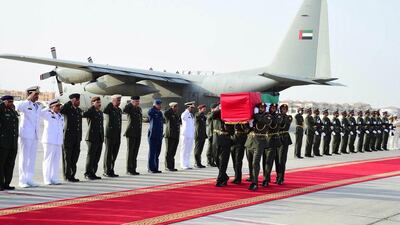The declaration by Sheikh Khalifa that November 30 will become a public holiday known as Martyrs' Day comes at a time when this country continues to entrench its strong sense of identity and common purpose. Every year, the country will take pause to honour Emiratis who have died performing their civil, military and humanitarian duties.
The recent deaths of Emirati servicemen in Yemen underscore the debt we as a nation owe to those who are prepared to defend our way of life. Moreover, having the day fall just before the annual National Day holiday on December 2 serves an important psychological function.
Before we celebrate the union, it is appropriate to mourn those who have given their lives for it. The first UAE martyr was a Ras Al Khaimah policeman, Salem Suhail bin Khamis, who was shot dead by Iranian invaders in November 1971 while defending our sovereignty on Greater Tunb in the Arabian Gulf. The most recent was Corporal Abdul Rahman Al Beloushi, who lost his life in Yemen while helping the Saudi-led coalition to restore that country’s internationally recognised government.
The transition from mourning to celebration will enable us to better acknowledge the fact that the protection of our country and our national interests sometimes requires individual sacrifice. By experiencing a range of emotions – from grief to pride – our country will come closer together. This is all the more important for the young people who paint their faces in the colours of the flag, for they will learn what it means to be a patriot.
Those who answer the call to, as Sheikh Khalifa has said, “keep the UAE flag flying aloft while they were performing their national duties”deserve proper, formal remembrance and recognition. Their names – and those of our other martyrs – will live on, written in our history books and etched in our hearts.
Martyrs’ Day will be a solemn and reflective event that will complement the traditional National Day celebrations. The exuberance that accompanies the latter will be all the more poignant because of what comes before.

